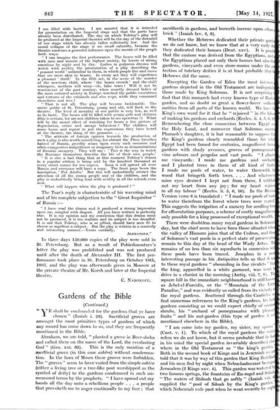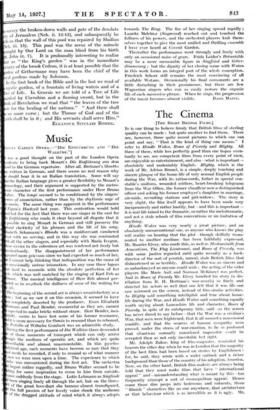Gardens of the Bible
(Continued.) yE shall be confounded for the gardens that ye have chosen " (Isaiah i. 29). Sacrificial groves are amongst the most primitive types of gardens of which any record has come down to us, and they are frequently mentioned in the Bible.
Abraham, we are told, " planted a grove in Beer-sheba and called there on the name of the Lord, the everlasting God " (Gen. xxi. 33).. This is the only mention of a sacrificial grove (in this case ashera) without condemna- tion. In the laws of Moses these groves were forbidden. The " groves " seem to have varied from the simple ashera (either a living tree or a tree-like post worshipped as the symbol of deity) to the gardens condemned in such un- measured terms by the prophets. " I have spread out my hands all the day unto a rebellious people . . . a people that provoketh me to anger continually to my face ; that sacrificeth in gardens, and burneth incense upon altars brick " (Isaiah lxv. 2, 3).
Whether the Hebrews dedicated their private garde we do not know, but we know that at a very early da they dedicated their houses (Deut. xxv). It is possi that the custom was derived from the Egyptians, and the Egyptians placed not only their houses but also th gardens, vineyards and even store-rooms under the p tection of tutelary deities it is at least probable that t Hebrews did the same.
Excepting the Garden of Eden the most interest:, gardens depicted in the Old Testament are indisputab those made by King Solomon. It is not surprising find that this monarch had every known type of Eaite garden, and no doubt so great a flower-lover collect rarities from all parts of the known world. We have King's own word for it that he " rejoiced " in the lalw of making his gardens and orchards (Eccles. ii. 4, 5, 6,10 Remembering the close connexion between Egypt an the Holy Land, and moreover that Solomon marr Pharaoh's daughter, it is but reasonable to suppose th the • King's gardens closely resembled those for whit Egypt had been famed for centuries, magnificent form gardens with shady avenues, groves of pomeg rana., vine arbours and pergolas and vast pools. " I plant,: me vineyards : I made me gardens and orchard and I planted trees in them of all kind of fruits I made me pools of water, to water therewith tli wood that bringeth forth trees. . . . And whatsoe, mine eyes desired I kept not from them, I withhei not my heart from any joy; for my heart rejoicc in all my labour " (Eccles. ii. 5, 6, 10): In the Kevin Version verse 6 is translated : " I made me pools of wat( to water therefrom the forest where trees were reared, , This suggests the irrigation of a nursery for seedling tree for afforestation purposes, a scheme of costly magnificent r, only possible for a king possessed of exceptional wealth.
There were doubtless many royal gardens in Solomon' day, but the chief seem to have been those situated when the valley of Hinnom joins that of the Cedron, and thrt of Solomon's vast pools in a perfect state of preservatie remain to this day at the head of the Wady Artas. remains of no less than six aqueducts in connexion wit. these pools have been traced. Josephus in a nun' interesting passage in his Antiquities tells us that it sia to these royal gardens " abounding in fine rivulets " th the king, apparelled in a white garment, was wont to drive in a chariot in the morning (Antiq. viii. 7, 8). Ti: square hill in the immediate neighbourhood is still 10101,9 as Jebel-el-Fureidis, or the " Mountain of the Litt] Paradise," and was evidently so called from its vicin it y the royal gardens. Scattered through the Canticles Iv find numerous references to the King's gardens, his licd gardens consisting as we could expect chiefly of scent shrubs, his " orchard of pomegranates with oleaian fruits " and his nut-garden (this type of garden is mentioned elsewhere in the Bible).
" I am come into my garden, my sister, my spouse (Cant. v. 1). To which of the royal gardens the write refers we do not know, but it seems probable that he ha in his mind the special garden invariably described d where in the Old Testament as " the king's garden. Both in the second book of Kings and in Jeremiah ice 41 told that it was by way of this garden that King Zede and his men fled by night when Nebuchadnezzar besieg Jerusalem (2 Kings xxv. 4). This garden was watered h two famous springs, the fountains of En-rogel and Silos' " The waters of Shiloah that go softly " (Isaiah viii. supplied the " pool of Siloah by the King's garde" which Nehemiah rode past-when he went serretly by nigh 0 survey the broken-down walls and gate of the desolate its- of Jerusalem (Neh. ii. 12-15), and subsequently he ells us that the wall of this pool was repaired by Shallun Sch. iii. 15). This pool was the scene of the miracle rought by Our Lord on the man blind from his birth t. John ix. 7). It is profoundly interesting to realize hit as " the King's garden " was in the immediate cinity of the brook Cedron, it is at least possible that the irden of Gethsemane may have been the chief of the oval gardens made by Solomon.
In the first book of the Bible and in the last we read of mystic garden, of a fountain of living waters and of a rip of Life. In Genesis we are told of a Tree of Life larded by Cherubim and a flaming sword, but in the ook of Revelation we read that " the leaves of the tree ore for the healing of the nations." " And there shall no more curse ; but the Throne of God and .of the amh shall be in it ; and His servants shall serve Him."
ELEANOUR SINCLAIR ROHDE.



























































 Previous page
Previous page